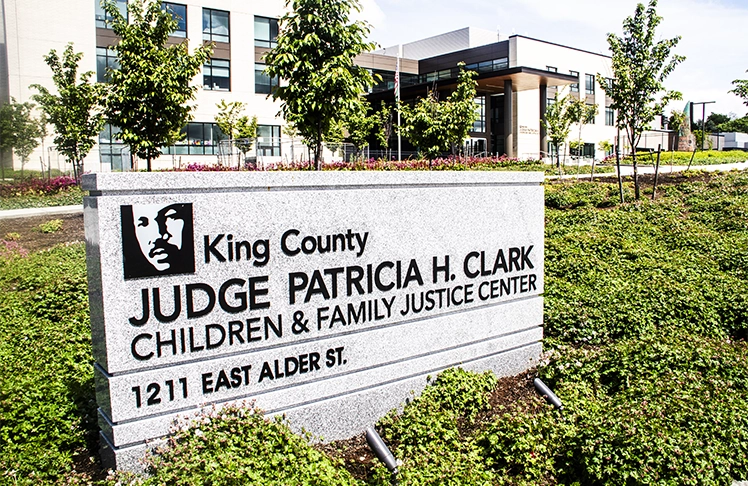A new report from the King County Auditor’s Office discovered that while fewer adolescents are being held at King County’s Patricia H. Clark Children and Family Justice Center (CCFJC), those that are held in secure detention are facing more serious charges and are experiencing longer stays. Stays that officials say are much longer than the facility was designed to support.
“While fewer youth are being held in the juvenile detention center, we found that many of them are facing longer stays and often times longer than what the facility was designed to support,” says Brooke Leary, Audit Director at the King County Auditor’s Office. “And while the Department of Adult and Juvenile Detention (DAJD) doesn’t control who is there and how long they are there for, it is the responsibility of DAJD to care for the youth that are housed and so it is really important for king county to take steps to make sure that they can provide kids behavioral, emotional and enrichment supports that they need.”
Auditors presented the findings of their latest report last Wednesday at a meeting of the King County Council’s Law and Justice Committee.
According to the report, the secure detention facilities at the CCFJC were designed with short stays in mind, as the facility lacks the enrichment, educational, and mental health support needs of the kids experiencing long periods of detention.
Over the last six and a half years, the average length of stays in juvenile detention tripled, increasing from 12 days in 2017, which predates the opening of the CCFJC facility, to 36 days in mid-2023. In addition, auditors say that many youths have stayed longer than 100 days and some longer than a year.
“We have just published our audit of the juvenile secure detention and in this audit, we were looking at whether and how King County is meeting the needs of youth that being held in secure detention at the Clark Children and Family Justice Center,” says Leary. “What we found in doing this work is that there have been some changes over time, looking at the data, in who is being held in secure detention and for how long they are being held in secure detention.”
“Because there have been those changes and what the population is in the facility, we found that King County is not always meeting the behavioral, educational and mental needs of these youth that are living there,” Leary adds.
King County Auditor Kymber Waltmunson agrees with the findings and says that more work needs to be done to help the county to adhere to and meet the needs of those young people.
“Youth in the care of King County deserve care that meets their behavioral, emotional, and enrichment needs,” said Waltmunson. “Our goal in this work is to help the county better meet those needs.”
The report found that with the lack of support, and staffing shortages, King County’s Juvenile Division has had a vacancy rate for juvenile detention officers ranging between 15% and 30% since 2018. This has led to significant overtime and staff burnout for juvenile detention officers, as well as the declared intention to close the facility has hindered recruitment and adversely impacted staff culture.
In addition, the staffing shortages have led to youth spending more time than intended confined to their cells. An analysis revealed that youth held in secure detention spent an average of 55 additional hours confined in their cells per month, or just under an additional two hours per day in cell, because of staffing shortages in the first half of 2023.
That’s in addition to the standard 12-hour sleeping period for youth in secure detention. This means that youth received roughly 10 hours daily, on average, total outside of their cells for all education, activities and other programs.
“When there weren’t enough officers working it would be harder to rotate children into activities, schoolwork and other programs,” says Leary. “There were some concerns that kids weren’t receiving enough class time.”
Other key takeaways from the report include:
Youth in secure detention for long periods need more services, but current county efforts do not address these needs:
Youth facing adult charges have more behavior problems:
Some youth in secure detention rarely meet with their attorney or family:
Youth in secure detention were unaware of ways to share concerns about living conditions:
In the report auditors make ten recommendations. Some of the recommendations they make focus on the DAJD and really what are the needs of the youth that are being held there now.
The report also focuses on what are those needs, how are they different from the types of support that were provided when the stays were shorter than they are now? What should they do to provide age appropriate therapeutic, and skills needs and support to those kids.
The audit also makes recommendations for staffing needs that they might have. The Auditor’s office always shares their recommendation proactively with those we are auditing.
The audit made 10 recommendations to address problems and barriers identified in the audit. Some key recommendations include:
• The County Executive and DAJD conduct an analysis of the needs of youth who are securely detained, considering and documenting the actual lengths of stay for youth, their therapeutic and skills needs, and how services could be differentiated for longer lengths of stay.
• The County Executive and DAJD should implement a plan to address gaps between the programs and services that securely detained youth need and those that are currently being provided.
• DAJD should track, document, and report the number of youths who are not visited in person by their attorney for 30 days or more.
• The Juvenile Division of DAJD should work with the County Ombuds to ensure that the process to submit grievances to the Ombuds is available to youth in secure detention custody and that the materials provided to youth explain the differences between grievances to them and to DAJD.
• The Juvenile Division of the Department of Adult and Juvenile Detention should develop and implement a policy to test water quality at the Patricia H. Clark Children and Family Justice Center at least annually.
Leary assures the community that with these recommendations, the DAJD has committed itself to bettering the current environment in the best interests of the children held in detention.
“We did see when we were conducting this audit that DAJD was committed and is committed to continue its improvement in the facility. During the time we conducted this audit we saw them implementing different initiatives to provide more support to youth who are held in the facility,” says Leary. “So, we did see the leadership who work in the facility care about the youth and are trying to improve the circumstances.”

